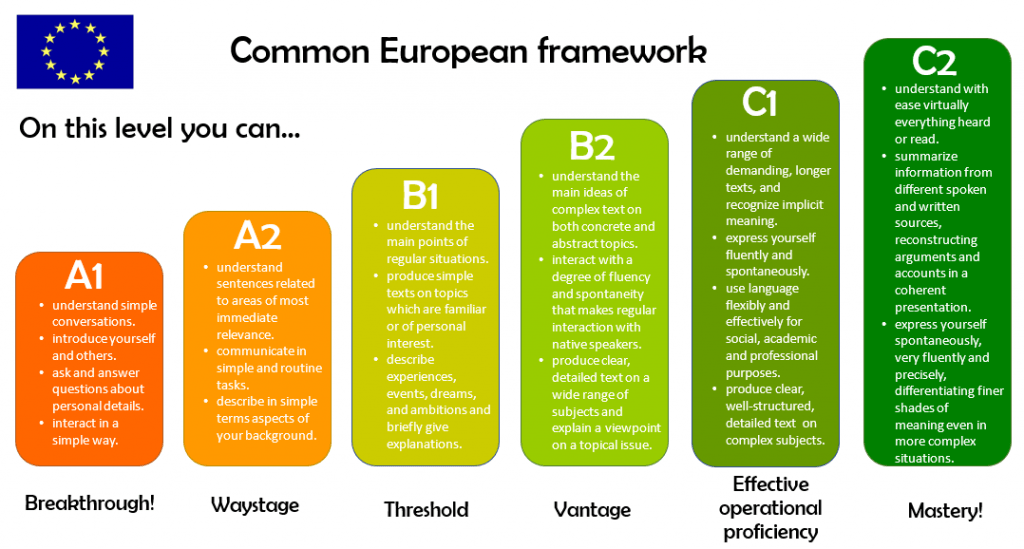The Common European Framework(CEFR) divides learners into three broad divisions that can be divided into six levels
For each level, it describes what a learner should be able to do in each skill area: reading, listening, speaking and writing.

А1 – Beginners
Can understand and use familiar everyday expressions and very basic phrases aimed at the satisfaction of needs of a concrete type. Can introduce himself/herself and others and can ask and answer questions about personal details such as where he/she lives, people he/she knows and things he/she has. Can interact in a simple way provided the other person talks slowly and clearly and is willing to help.
A2 – Elementary
Can understand sentences and frequently used expressions related to the areas of most immediate relevance (e.g. very basic personal and family information, shopping, local geography, employment). Can communicate in simple and routine tasks requiring a simple and direct exchange of information on familiar and routine matters. Can describe in simple terms aspects of his/her background, immediate environment and matters in the areas of immediate need.
B1 – Intermediate
Can understand the main points of clear standard input on familiar matters regularly encountered at work, school or during his/her free time, etc. Can deal with most situations likely to arise while travelling in an area where the language is spoken. Can produce simple coherent texts on topics which are familiar or of personal interest. Can describe experiences and events as well as dreams, hopes and ambitions. Can briefly give reasons and explanations for opinions and plans.
B2 – Upper intermediate
Can understand the main ideas of a complex text on both concrete and abstract topics, including technical discussions related to his/her field of specialisation. Can interact with a degree of fluency and spontaneity that makes regular interaction with native speakers quite possible without strain for either party. Can produce clear, detailed texts on a wide range of subjects and explain his/her viewpoint on a topical issue giving the advantages and disadvantages of various options.
C1 – Advanced
Can understand a wide range of demanding, longer texts, and recognise implicit meaning. Can express himself/herself fluently and spontaneously without much obvious searching for expressions. Can use language flexibly and effectively for social, academic and professional purposes. Can produce clear, well-structured, detailed texts on complex subjects, showing controlled use of organisational patterns, connectors and cohesive devices.
C2 – Proficiency
Can understand with ease virtually everything heard or read. Can summarise information from different spoken and written sources, reconstructing arguments and accounts in a coherent presentation. Can express himself/herself spontaneously, very fluently and precisely, differentiating finer shades of meaning even in more complex situations.
Before starting a course with us, those participants who have studied Polish will write a placement test which is intended to assess their knowledge of the grammar and vocabulary of the Polish language.
On the basis of the test results and after the conversation with the teacher, you will be placed in a group suitable for your language level.




